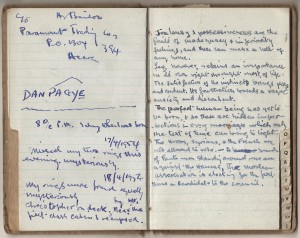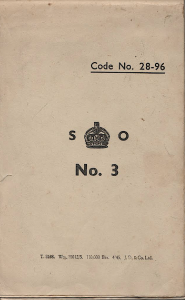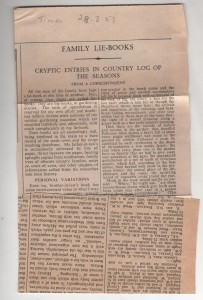 This fragmentary, though fascinating Diary, that occupies a section of a tiny Address Book, was found in the Jot HQ archives. It records a visit to west Africa in the first few months of 1954 by an anonymous male diarist whose remark that Africa’s dry season of Harmattan was ‘our winter ‘ suggests that he may have been a native African or have had African heritage. He also mentions visiting his mother in Ghana. Moreover, a solo entry in the Address Book dated two years before the Diary mentions ‘ English lessons ‘, and the erratic spelling and awkward grammar of the Diary entries are also strongly suggestive.
This fragmentary, though fascinating Diary, that occupies a section of a tiny Address Book, was found in the Jot HQ archives. It records a visit to west Africa in the first few months of 1954 by an anonymous male diarist whose remark that Africa’s dry season of Harmattan was ‘our winter ‘ suggests that he may have been a native African or have had African heritage. He also mentions visiting his mother in Ghana. Moreover, a solo entry in the Address Book dated two years before the Diary mentions ‘ English lessons ‘, and the erratic spelling and awkward grammar of the Diary entries are also strongly suggestive.
The diarist’s impressions of Sierra Leone and the Gold Coast ( which in 1957 gained its independence as Ghana) must be read alongside the names and addresses that appear throughout the Address Book of people the diarist either encountered on his voyage to Africa, met while there or had previously jotted down as contacts to be visited. The diarist seems to have been a salesman of some kind keen to open new trading links between the UK and West Africa. For instance, there are allusions to ‘sorting out ‘samples, possibly of shirts, to show to potential clients and there is a reference to the ‘potentialities’ for Bavarian beer. The diarist would not have been the first business man to have booked a voyage on the famous Elder Dempster ships that ran regularly from Liverpool to ports in West Africa, carrying goods there and returning with raw materials. On each voyage there would have been a limited number of places for passengers—perhaps two dozen or so. Our diarist appears to have stayed in Africa from late January until May before leaving for London and then for Sweden.
On his voyage out on the S. S. ‘Apapa’ he befriended some fellow passengers and started each day with a long run around the deck. In Africa he was entertained by local business men and dignitaries, and he recorded his impressions of these people as well as social mores and political movements of the two countries he visited, while all the time expressing love for ( presumably ) his wife Mavis.
28th. January, 1954. Sailed today from Liverpool 4.30, sharing Stateroom with a Mr Udoh, a business (man) who own the raffia shop in Manette St., London.
After high tea I took a bath. Mr Udoh played some records. Many Africans were shower-bathing. In bed at 10. Read till about 11.30.
29th Friday. The steward brought us tea at 6 a.m. breakfast at 8 consisting of chilled grapefruit and the grits.
Continue reading




